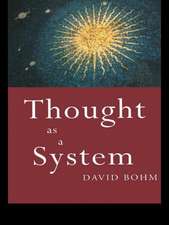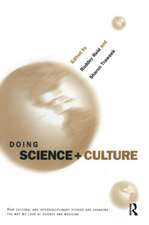The Philosophy of Science and Technology Studies
Autor Steve Fulleren Limba Engleză Hardback – 16 dec 2005
In his characteristically provocative style, he offers the first sustained treatment of the philosophical foundations of STS and suggests fruitful avenues for further research. With stimulating discussions of the Science Wars, the Intelligent Design Theory controversy, and theorists such as Donna Haraway and Bruno Latour, Philosophy of Science and Technology Studies is required reading for students and scholars in STS and the philosophy of science.
| Toate formatele și edițiile | Preț | Express |
|---|---|---|
| Paperback (1) | 362.82 lei 6-8 săpt. | |
| Taylor & Francis – 14 dec 2005 | 362.82 lei 6-8 săpt. | |
| Hardback (1) | 998.40 lei 6-8 săpt. | |
| Taylor & Francis – 16 dec 2005 | 998.40 lei 6-8 săpt. |
Preț: 998.40 lei
Preț vechi: 1217.56 lei
-18% Nou
Puncte Express: 1498
Preț estimativ în valută:
191.04€ • 199.100$ • 158.08£
191.04€ • 199.100$ • 158.08£
Carte tipărită la comandă
Livrare economică 05-19 aprilie
Preluare comenzi: 021 569.72.76
Specificații
ISBN-13: 9780415941044
ISBN-10: 0415941040
Pagini: 208
Dimensiuni: 152 x 229 x 17 mm
Greutate: 0.4 kg
Ediția:1
Editura: Taylor & Francis
Colecția Routledge
Locul publicării:Oxford, United Kingdom
ISBN-10: 0415941040
Pagini: 208
Dimensiuni: 152 x 229 x 17 mm
Greutate: 0.4 kg
Ediția:1
Editura: Taylor & Francis
Colecția Routledge
Locul publicării:Oxford, United Kingdom
Notă biografică
Steve Fuller is Professor of Sociology at the University of Warwick, England. Formally trained in history, philosophy, and sociology of science, he is best known for his pioneering work in social epistemology. His most recent books include Thomas Kuhn: A Philosophical History for Our Times and Knowledge Management Foundations.
Cuprins
Table of Contents:I: Introduction: The Conspicuous Absence of Philosophy from Science & Technology StudiesII: The Sociology of Knowledge: The Philosophical Backdrop to STS1. Philosophical Foundations and Main Sociological Traditions2. Science as a Special Problem for the Sociology of Knowledge3. Kuhn's Chequered Legacy to STS4. The Punch Line: A Sociology of Science that is Not a Sociology of Knowledge5. Relativism and the Illusion of Autonomy in Science6. STS's Janus-faced Antirealism: Relativism versus Constructivism7. Conclusion: So Is Relativism the Wrong Target?III: Philosophy in, of, and beyond the Scientific Field Site8. Making Philosophy Safe for STS: The Rise of the Underlaborer9. Philosophy by Sociological Means: STS as Fieldwork10. STS Catches Philosophy by the Achilles Heel: The Problem of Replication11. What Is Living and Undead in Actor-Network Theory12. STS Fieldwork as a Reflection of the Shifting Material Conditions of Scientific Work13. New Horizons for Laboratory Life: Science as a Site of Generational Conflict and Jurisdictional AmbiguityIV: Postmodern Positivism: STS by Another Name?14. Platonism as Proto-Positivism15. The Dialectical History of Positivism16. Postmodernism as Positivism's Bastard's Child17. Motivating the Science Wars: The Politics of Popularizing and Esotericizing Science18. The Elusive Spontaneous Philosophy of the Scientists Defended in the Science Wars19. Does Research Fraud Matter? Reflections on the Sokal Hoax as a Social Experiment20. What Should Have Been Done About Sokal? What Can Be Done About Positivism?V: Re-Enchanting Science: Beyond Puritans and Gnostics21. The Science Wars as Signaling the End of Scientific Puritanism22. The Secularization of Science as a Precondition to Its Re-enchantment23. Re-enchanting Science with a Vengeance: Gnostic Scientism24. Prolegomena to the Hidden History of Gnostic Biology25. Distinguishing the Enchanted and Disenchanted Mind: The Mark of Theodicy26. Two Disenchanted Theodicies: Invisible Hand and Natural Selection27. The Cost of Disenchantment: A Failed Scientific Defense of Human Freedom28. Conclusions: Meeting Weber's Challenge and Transcending the Science WarsVI: Citizen Science: Cultivating a Life in STS29. Introduction: Beware of Greeks Bearing Historical Precedents30. Expertise and Its Discontents: Some Institutional Alternatives31. Institutionalizing the Public Understanding of Science in Consensus Conferences32. The Prospects for Scientific Citizenship Today33. Conclusion: Towards a Rhetorical Reclamation of ScienceNotesIndex






















